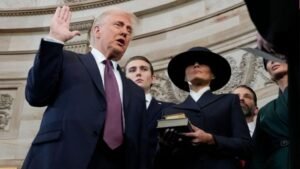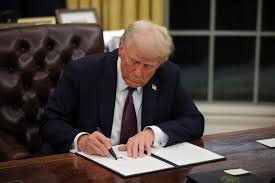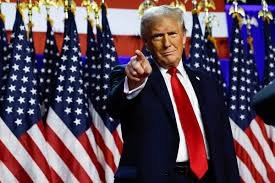The dawn of Donald Trump’s second term as the 47th President of the United States has sent ripples of uncertainty across the globe. While his policies were contentious during his first term, his second round of sweeping ‘radical’ executive actions has raised new questions about the future of international relations. For some nations, particularly China, Trump’s approach has unintentionally supported their global standing. Chinese internet users affectionately coined the term, “Chuan Jianguo,” or “Make China Great,” to describe how Trump’s policies unintentionally fuelled China’s rise on the global stage.

Trump’s first term undeniably benefited China in several ways. According to the executive dean of the Chongyang Institute for Financial Studies, Renmin University, China, Professor Wang Wen, his administration’s chaotic political climate exposed the US’ internal fractures, weakening its image as a beacon of democracy.
Additionally, Trump’s tariffs and trade restrictions inadvertently encouraged China to bolster its technological self-reliance and strengthen alliances with the non-Western world, marking a major pivot away from US influence.
Trump’s Second-Term Executive Orders: Implications for Nigeria, US Policies, and Africa’s Future.
But how do Trump’s new policies in his second term affect Nigeria and the broader African continent, over 8,000 kilometers away? The implications are profound. Trump’s executive orders have set the stage for a dramatic shift in U.S.-Africa relations, affecting everything from foreign aid to trade, climate action, and global health initiatives. For Nigeria, a nation with deep ties to US foreign policy, these changes will alter its developmental trajectory and shape its future in unpredictable ways.

Trump’s Executive Orders and Their Global Reverberations
Trump’s second term has already seen the signing of several controversial executive orders, each reflecting his “America First” philosophy. These orders are reshaping US foreign policy and altering the global balance of power in ways that directly affect nations like Nigeria. In this report, Gom Mirian explores some of the key orders and their consequences for Nigeria and the African continent.
US Withdrawal from the World Health Organisation (WHO)

Perhaps the most far-reaching of Trump’s orders was his decision to withdraw the United States from the World Health Organisation (WHO). Trump’s administration criticised the WHO’s management of global health crises, claiming that the US contributed disproportionately to the organisation’s budget without receiving commensurate benefits.
The US had been the largest contributor to the WHO, providing over $1 billion annually—roughly 15% of the organisation’s total funding. The withdrawal leaves a substantial gap in global health financing, which is particularly alarming for African nations like Nigeria, where health systems are already under strain.
Dr. Jonathan Dangana, a Nigerian public health expert, underscores the risks this poses: “Nigeria, along with many other African nations, will feel the absence of US support in global health initiatives. The WHO has been instrumental in coordinating health responses during emergencies like the Ebola outbreak and the COVID-19 pandemic. Without US backing, the global health response will be weaker, jeopardizing efforts in fragile health systems like Nigeria’s.”
This decision also places the U.S. at risk of being less prepared for future pandemics. As infectious disease expert, Preeti Malani from the University of Michigan explains, “Preventing and controlling outbreaks is not just about the health of communities but also about economics and national security.”
US Withdrawal from the Paris Climate Agreement

Trump’s decision to pull the US out of the Paris Climate Agreement during his first term already sparked global concern. This withdrawal marks a critical loss in global leadership on climate change, an issue of immense importance for countries like Nigeria.
Africa faces significant climate challenges, including extreme weather events like droughts, floods, and unpredictable agricultural conditions, all occasioned by climate change.
Professor Chris Eherinye, an economist focused on development in Africa, expresses concern: “Without US leadership in the Paris Agreement, the ability of African nations, including Nigeria, to secure funding for climate change mitigation and adaptation efforts is severely limited. The continent is on the frontlines of climate change, and Trump’s stance could undermine global climate initiatives at a time when Africa needs them most.”
Trump’s decision to prioritise fossil fuels over renewable energy further complicates Nigeria’s energy transition. As one of Africa’s largest oil producers, Nigeria’s economy is heavily dependent on oil exports, making the global push for cleaner energy solutions critical for its long-term development.
Suspension of Foreign Aid Programmes

On his first day in office, Trump signed an executive order freezing all foreign aid for 90 days. This freeze was meant to allow his administration to assess the effectiveness of US foreign assistance and realign it with American priorities.
For Nigeria, which relies heavily on US aid for health programmes, education, and emergency relief, this suspension presents significant risks.
In sectors such as healthcare, where US aid has been pivotal in combating diseases like HIV/AIDS, malaria, and polio, this freeze could delay or reduce the flow of essential funds. “The freeze will hit Nigeria’s health programs hard,” Professor Eherinye warns. “With Nigeria already grappling with inadequate healthcare infrastructure, a reduction in US aid will worsen the challenges faced by the Nigerian government and local institutions.”
New Trade and Tariff Policies: The External Revenue Service
Trump’s creation of the External Revenue Service (ERS) to oversee tariffs and duties under his “America First” trade policy will directly impact global trade relations. Nigeria, a major exporter of oil and raw materials to the US, could face significant disruptions in its trade with America if tariffs and duties increase. The potential rise in trade barriers could negatively affect Nigerian businesses, making it more challenging to access US markets.
As Professor Eherinye points out, “The US is one of Nigeria’s largest trading partners. If tariffs rise, Nigerian businesses may be forced to seek alternative markets, potentially leading to economic instability and a slowdown in growth.”
End of Birthright Citizenship: Indirect Impact on the Nigerian Diaspora
One of the most contentious orders Trump has signed in his second term is the move to end birthright citizenship, a policy that grants US citizenship to any child born on American soil. While this policy directly affects immigrant communities, it could have ripple effects on Nigeria’s diaspora in the US Many Nigerian families have relied on the birthright policy to secure citizenship for their children, and any changes could create uncertainty for those planning to migrate to or live in the US
Though the legality of ending birthright citizenship is contested and would require constitutional amendments, Trump’s push to change immigration policies has already created anxiety among Nigerian families in the US.
National Energy Emergency and Its Impact on Nigeria’s Oil Sector
Trump’s declaration of a national energy emergency and his push to expand fossil fuel production in the US will have mixed implications for Nigeria. On one hand, increased production of US oil could reduce global crude prices, which may benefit Nigeria by lowering the cost of fuel imports. However, Trump’s emphasis on fossil fuels over renewable energy could undermine Nigeria’s efforts to transition to more sustainable energy solutions.
Professor Eherinye advises, “In the short term, Nigeria may see some benefits from lower oil prices, but the long-term trend is clear. The global shift toward renewable energy will continue, and Nigeria needs to diversify its energy sector to remain competitive in a changing global economy.”
What should Nigeria Expect for the Next Four Years?
Trump’s executive orders will reshape Nigeria’s relationship with the US and have a lasting impact on Africa’s development. While some opportunities may arise, particularly in trade and energy, the risks are significant, especially in the areas of healthcare, climate change, and foreign aid.
In light of these shifts, Professor Eherinye offers practical advice: “Nigeria must strengthen its partnerships with other global powers, invest in self-sustaining growth, and reduce its dependency on foreign assistance. The next four years will require strategic planning, innovation, and a concerted effort to build domestic capacity, especially in healthcare and energy.”
As Trump’s second term commences, Nigeria faces both challenges and opportunities. While the global landscape becomes more uncertain, Nigeria has the potential to adapt and thrive if it can navigate these changes effectively. By diversifying its economy, strengthening local industries, and forging new international alliances, Nigeria can weather the storm and emerge stronger in the face of evolving global dynamics.
Trump’s second term promises to be a significant transformation for the US and the global community. For Nigeria, the coming years will demand resilience, adaptability, and foresight to mitigate the impact of Trump’s policies and capitalise on new opportunities in trade, energy, and beyond.



